Hexagramme 40 du Yi Jing - Trait 5
L'hexagramme : 40
Un hexagramme est une combinaison de six traits yin et yang.

40.5 (40 > 47) - THE KIEH HEXAGRAM.
The fifth line, divided, shows (its subject), the superior man ( = the ruler), executing his function of removing (whatever is injurious to the idea of the hexagram), in which case there will be good fortune, and confidence in him will be shown even by the small men.
Bing DeepL Google Yandex40.5 (40 > 47) - Achieving one's goals
Only a capable person can show the solution.
Bing DeepL Google Yandex40.5 (40 > 47) - Achieving one's goals
Only a capable person can show the solution.
Bing DeepL Google Yandex40.5 (40 > 47) - Kieh, la libération
Kieh : 1. Délivrer, faire échapper, échapper au danger ; 2. Disperser ; 3. Ouvrir, séparer, s’ouvrir. Se dit du mouvement de la germination. 4. Résoudre une difficulté, une complication.
C’est au sage d’écarter (les maux) et de résoudre (les difficultés) ; s’il y réussit, il gagnera la confiance du vulgaire.
Bing DeepL Google Yandex40.5 (40 > 47) - Arriver à ses fins
Seule une personne compétente peut montrer la solution.
Bing DeepL Google Yandex40.5 (40 > 47) - Módosítás
Csak egy alkalmas személy tudja megmutatni a megoldást.
Bing DeepL Google YandexLes trigrammes
Les trigrammes sont des combinaisons de trois traits yin et yang. Dans l'hexagramme, les trois traits du dessous constituent le trigramme inférieur et représentent la situation intérieure. Les trois lignes du haut constituent le trigramme supérieur et représentent la situation extérieure.
trigSup2


trigInf

L'hexagramme nucléaire : 63.6 (63 > 37)
L'hexagramme nucléaire est l'association des deux trigrammes intérieurs (traits 2,3,4 et 3,4,5). Il représente la racine, ou l'origine de la situation.

63.6 (63 > 37) - THE KÎ 3Î HEXAGRAM.
The topmost line, divided, shows its subject with (even) his head immersed. The position is perilous.
Bing DeepL Google Yandex63.6 (63 > 37) - Worrying about a return to difficulties
The others avoid helping, so one continues to improve to repair without them.
Bing DeepL Google Yandex63.6 (63 > 37) - Worrying about a return to difficulties
The others avoid helping, so one continues to improve to repair without them.
Bing DeepL Google Yandex63.6 (63 > 37) - Tchi tzi, ce qui suit l’achèvement
Tchi-tzi : traversée achevée, achèvement, succès, moyen d’achever, compléter.
Celui qui, en traversant (un fleuve), se mouille la tête, est en danger. (Si la tête même entre dans l’eau.)
Cette situation est dangereuse, on ne peut en prévoir l’issue.
63.6 (63 > 37) - Craindre un retour des difficultés
Les autres évitent d'apporter leur aide, alors on continue de s'améliorer pour réparer sans eux.
Bing DeepL Google Yandex63.6 (63 > 37) - Maximum
A többiek óvakodnak a segítségnyújtástól, így nélkülük javít tovább.
Bing DeepL Google YandexLe dérivé (Fan Yao) : 47.5
Le même trait sur l'hexagramme après la mutation. Il représente ce qui peut être fait APRÈS pour corriger la situation décrite par ce trait, un peu comme un remède ou une solution.

47.5 (47 > 40) - THE KHWĂN HEXAGRAM.
The fifth line, undivided, shows its subject with his nose and feet cut off. He is straitened by (his ministers in their) scarlet aprons. He is leisurely in his movements, however, and is satisfied. It will be well for him to be (as sincere) as in sacrificing (to spiritual beings).
Bing DeepL Google Yandex47.5 (47 > 40) - Facing disbelief
One is not believed, but if one shows one's commitment, then one will be listened to.
Bing DeepL Google Yandex47.5 (47 > 40) - Facing disbelief
One is not believed, but if one shows one's commitment, then one will be listened to.
Bing DeepL Google Yandex47.5 (47 > 40) - K’uán, la détresse
K’uán : détresse, abattement, dureté, sévérité, mauvais traitements.
(Id.) Homme auquel on a entaillé le nez et les pieds, maltraité par les gens du peuple (les chemises rouges). [S’il sait encore rester ferme et digne, il pourra utilement offrir le sacrifice.
L’homme au nez entaillé figure celui qui échoue dans ses entreprises. S’il reste ferme dans la justice, il retrouvera le bonheur. Com. II.]
47.5 (47 > 40) - Affronter l'incrédulité
On n'est pas cru mais si l'on montre son engagement, alors on sera écouté.
Bing DeepL Google Yandex47.5 (47 > 40) - Kényelmetlenség
Hiteltelen, de ha megmutatja elkötelezettségét, hallgatni fognak rá.
Bing DeepL Google YandexLa jointure: 48.2
Le dérivé du réciproque. Il représente ce qui aurait pu être fait AVANT pour prévenir la situation décrite par ce trait, un peu comme un remède ou une solution.

48.2 (48 > 39) - THE 3INGHEXAGRAM.
The second line, undivided, shows a well from which by a hole the water escapes and flows away to the shrimps (and such small creatures among the grass), or one the water of which leaks away from a broken basket.
Bing DeepL Google Yandex48.2 (48 > 39) - Lacking cohesion
The others don't want to because one needs to get organised before being trusted.
Bing DeepL Google Yandex48.2 (48 > 39) - Lacking cohesion
The others don't want to because one needs to get organized before being trusted.
Bing DeepL Google Yandex48.2 (48 > 39) - Tsing, le puits
Tsing : puits.
Un puits, un vivier, qui par un trou laisse échapper les poissons, ou dont le seau est percé, brisé, laisse couler l’eau, ne peut plus servir. Com. II.
Bing DeepL Google Yandex48.2 (48 > 39) - Manquer de cohésion
Les autres ne veulent pas car on a besoin de s'organiser avant qu'ils ne nous fassent confiance.
Bing DeepL Google Yandex48.2 (48 > 39) - Szervezet
A többiek vonakodnak mert először még rendbe kell raknia saját magát mielőtt bíznának benne.
Bing DeepL Google YandexLe réciproque : 39.2
L'hexagramme renversé. Il représente la situation opposée, et en tant que tel est essentiel pour la validation des commentaires.

39.2 (39 > 48) - THE KIEN HEXAGRAM.
The second line, divided, shows the minister of the king struggling with difficulty on difficulty, and not with a view to his own advantage.
Bing DeepL Google Yandex39.2 (39 > 48) - Rowing like a galley slave
Many difficulties to feed others.
Bing DeepL Google Yandex39.2 (39 > 48) - Rowing like a galley slave
Many difficulties to feed others.
Bing DeepL Google Yandex39.2 (39 > 48) - Kién, l’obstacle
Kién : Difficulté, danger, noble hardiesse.
Si le prince et ses ministres ont difficultés sur difficultés, ce n’est point (nécessairement) parce qu’ils recherchent leur propre avantage (ou : cela ne dépend pas nécessairement d’eux-mêmes).
Bing DeepL Google Yandex39.2 (39 > 48) - Ramer comme un galérien
Beaucoup de difficultés pour alimenter les autres.
Bing DeepL Google YandexMutations

40.5 (40 > 47) - THE KIEH HEXAGRAM.
The fifth line, divided, shows (its subject), the superior man ( = the ruler), executing his function of removing (whatever is injurious to the idea of the hexagram), in which case there will be good fortune, and confidence in him will be shown even by the small men.
Bing DeepL Google Yandex40.5 (40 > 47) - Achieving one's goals
Only a capable person can show the solution.
Bing DeepL Google Yandex40.5 (40 > 47) - Achieving one's goals
Only a capable person can show the solution.
Bing DeepL Google Yandex40.5 (40 > 47) - Kieh, la libération
Kieh : 1. Délivrer, faire échapper, échapper au danger ; 2. Disperser ; 3. Ouvrir, séparer, s’ouvrir. Se dit du mouvement de la germination. 4. Résoudre une difficulté, une complication.
C’est au sage d’écarter (les maux) et de résoudre (les difficultés) ; s’il y réussit, il gagnera la confiance du vulgaire.
Bing DeepL Google Yandex40.5 (40 > 47) - Arriver à ses fins
Seule une personne compétente peut montrer la solution.
Bing DeepL Google Yandex40.5 (40 > 47) - Módosítás
Csak egy alkalmas személy tudja megmutatni a megoldást.
Bing DeepL Google Yandex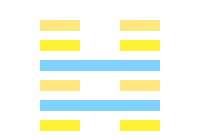
40.1.5 (40 > 58) - THE KIEH HEXAGRAM.
- 1. The first line, divided, shows that its subject will commit no error.
- 5. The fifth line, divided, shows (its subject), the superior man ( = the ruler), executing his function of removing (whatever is injurious to the idea of the hexagram), in which case there will be good fortune, and confidence in him will be shown even by the small men.
40.1.5 (40 > 58) - Calling for a ceasefire
One separates the rebels and the official troops to have them respect a truce.
Bing DeepL Google Yandex40.1.5 (40 > 58) - Calling for a ceasefire
One separates the rebels and the official troops to have them respect a truce.
Bing DeepL Google Yandex40.1.5 (40 > 58) - Kieh, la libération
Kieh : 1. Délivrer, faire échapper, échapper au danger ; 2. Disperser ; 3. Ouvrir, séparer, s’ouvrir. Se dit du mouvement de la germination. 4. Résoudre une difficulté, une complication.
-
1. Délivrer quelqu’un est chose excellente.
Quand le fort et le faible s’entendent selon la justice, il n’y a pas de faute à craindre. - 5. C’est au sage d’écarter (les maux) et de résoudre (les difficultés) ; s’il y réussit, il gagnera la confiance du vulgaire.
40.1.5 (40 > 58) - Demander un cessez-le-feu
On sépare les rebelles et les troupes officielles pour leur faire respecter une trêve.
Bing DeepL Google Yandex40.1.5 (40 > 58) - Módosítás
- 1. Fel akarja szabadítani magát, ez egy jó döntés.
- 5. Csak egy alkalmas személy tudja megmutatni a megoldást.

40.2.5 (40 > 45) - THE KIEH HEXAGRAM.
- 2. The second line, undivided, shows its subject catch, in hunting, three foxes, and obtain the yellow ( = golden) arrows. With firm correctness there will be good fortune.
- 5. The fifth line, divided, shows (its subject), the superior man ( = the ruler), executing his function of removing (whatever is injurious to the idea of the hexagram), in which case there will be good fortune, and confidence in him will be shown even by the small men.
40.2.5 (40 > 45) - Cutting in the deep
One studies the feasibility of an amicable separation.
Bing DeepL Google Yandex40.2.5 (40 > 45) - Cutting in the deep
One studies the feasibility of an amicable separation.
Bing DeepL Google Yandex40.2.5 (40 > 45) - Kieh, la libération
Kieh : 1. Délivrer, faire échapper, échapper au danger ; 2. Disperser ; 3. Ouvrir, séparer, s’ouvrir. Se dit du mouvement de la germination. 4. Résoudre une difficulté, une complication.
- 2. Délivrer est aussi heureux que, pour le chasseur, prendre trois renards et obtenir le prix, la flèche d’or. — Celui qui résout une difficulté, fait sortir d’une position difficile, est comme le chasseur qui prend trois renards et obtient la flèche d’or.
- 5. C’est au sage d’écarter (les maux) et de résoudre (les difficultés) ; s’il y réussit, il gagnera la confiance du vulgaire.
40.2.5 (40 > 45) - Trancher dans le vif
On étudie la faisabilité d'une séparation à l'amiable.
Bing DeepL Google Yandex40.2.5 (40 > 45) - Módosítás
- 2. Megkérik hogy válaszokat keressen mielőtt túl késő.
- 5. Csak egy alkalmas személy tudja megmutatni a megoldást.
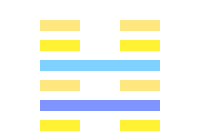
40.1.2.5 (40 > 17) - THE KIEH HEXAGRAM.
- 1. The first line, divided, shows that its subject will commit no error.
- 2. The second line, undivided, shows its subject catch, in hunting, three foxes, and obtain the yellow ( = golden) arrows. With firm correctness there will be good fortune.
- 5. The fifth line, divided, shows (its subject), the superior man ( = the ruler), executing his function of removing (whatever is injurious to the idea of the hexagram), in which case there will be good fortune, and confidence in him will be shown even by the small men.
40.1.2.5 (40 > 17) - Giving all the details
One presents to one's friends a more exhaustive version of what really happened.
Bing DeepL Google Yandex40.1.2.5 (40 > 17) - Giving all the details
One presents to one's friends a more exhaustive version of what really happened.
Bing DeepL Google Yandex40.1.2.5 (40 > 17) - Kieh, la libération
Kieh : 1. Délivrer, faire échapper, échapper au danger ; 2. Disperser ; 3. Ouvrir, séparer, s’ouvrir. Se dit du mouvement de la germination. 4. Résoudre une difficulté, une complication.
-
1. Délivrer quelqu’un est chose excellente.
Quand le fort et le faible s’entendent selon la justice, il n’y a pas de faute à craindre. - 2. Délivrer est aussi heureux que, pour le chasseur, prendre trois renards et obtenir le prix, la flèche d’or. — Celui qui résout une difficulté, fait sortir d’une position difficile, est comme le chasseur qui prend trois renards et obtient la flèche d’or.
- 5. C’est au sage d’écarter (les maux) et de résoudre (les difficultés) ; s’il y réussit, il gagnera la confiance du vulgaire.
40.1.2.5 (40 > 17) - Donner tous les détails
On présente à ses amis une version plus exhaustive de ce qui s'est réellement passé.
Bing DeepL Google Yandex40.1.2.5 (40 > 17) - Módosítás
- 1. Fel akarja szabadítani magát, ez egy jó döntés.
- 2. Megkérik hogy válaszokat keressen mielőtt túl késő.
- 5. Csak egy alkalmas személy tudja megmutatni a megoldást.
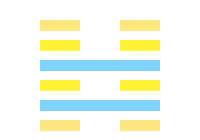
40.3.5 (40 > 28) - THE KIEH HEXAGRAM.
- 3. The third line, divided, shows a porter with his burden, (yet) riding in a carriage. He will (only) tempt robbers to attack him. However firm and correct he may (try to) be, there will be cause for regret.
- 5. The fifth line, divided, shows (its subject), the superior man ( = the ruler), executing his function of removing (whatever is injurious to the idea of the hexagram), in which case there will be good fortune, and confidence in him will be shown even by the small men.
40.3.5 (40 > 28) - Making the dead speak
One can make others say what one wants when they are absent.
Bing DeepL Google Yandex40.3.5 (40 > 28) - Making the dead speak
One can make others say what one wants when they are absent.
Bing DeepL Google Yandex40.3.5 (40 > 28) - Kieh, la libération
Kieh : 1. Délivrer, faire échapper, échapper au danger ; 2. Disperser ; 3. Ouvrir, séparer, s’ouvrir. Se dit du mouvement de la germination. 4. Résoudre une difficulté, une complication.
-
3. Si un porteur se met dans un char et qu’il survienne des voleurs, il sera attaqué et échappera difficilement ; s’il abandonne sa charge, il pourra se sauver.
Pour un porteur, aller en char est honteux ; c’est attirer sur soi les voleurs.
Il n’appartient pas à des gens du commun d’aller en char . - 5. C’est au sage d’écarter (les maux) et de résoudre (les difficultés) ; s’il y réussit, il gagnera la confiance du vulgaire.
40.3.5 (40 > 28) - Faire parler les morts
On peut faire dire aux autres ce qu'on veut quand ils sont absents.
Bing DeepL Google Yandex40.3.5 (40 > 28) - Módosítás
- 3. Ha valaki elhanyagolja, másoknak adja.
- 5. Csak egy alkalmas személy tudja megmutatni a megoldást.
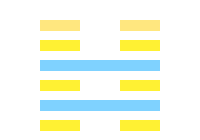
40.1.3.5 (40 > 43) - THE KIEH HEXAGRAM.
- 1. The first line, divided, shows that its subject will commit no error.
- 3. The third line, divided, shows a porter with his burden, (yet) riding in a carriage. He will (only) tempt robbers to attack him. However firm and correct he may (try to) be, there will be cause for regret.
- 5. The fifth line, divided, shows (its subject), the superior man ( = the ruler), executing his function of removing (whatever is injurious to the idea of the hexagram), in which case there will be good fortune, and confidence in him will be shown even by the small men.
40.1.3.5 (40 > 43) - Contemplating one's mistake
One recognises deep down inside that others have said the truth.
Bing DeepL Google Yandex40.1.3.5 (40 > 43) - Contemplating one's mistake
One recognizes deep down inside that others have said the truth.
Bing DeepL Google Yandex40.1.3.5 (40 > 43) - Kieh, la libération
Kieh : 1. Délivrer, faire échapper, échapper au danger ; 2. Disperser ; 3. Ouvrir, séparer, s’ouvrir. Se dit du mouvement de la germination. 4. Résoudre une difficulté, une complication.
-
1. Délivrer quelqu’un est chose excellente.
Quand le fort et le faible s’entendent selon la justice, il n’y a pas de faute à craindre. -
3. Si un porteur se met dans un char et qu’il survienne des voleurs, il sera attaqué et échappera difficilement ; s’il abandonne sa charge, il pourra se sauver.
Pour un porteur, aller en char est honteux ; c’est attirer sur soi les voleurs.
Il n’appartient pas à des gens du commun d’aller en char . - 5. C’est au sage d’écarter (les maux) et de résoudre (les difficultés) ; s’il y réussit, il gagnera la confiance du vulgaire.
40.1.3.5 (40 > 43) - Contempler son erreur
On reconnaît en son for intérieur que les autres ont dit la vérité.
Bing DeepL Google Yandex40.1.3.5 (40 > 43) - Módosítás
- 1. Fel akarja szabadítani magát, ez egy jó döntés.
- 3. Ha valaki elhanyagolja, másoknak adja.
- 5. Csak egy alkalmas személy tudja megmutatni a megoldást.

40.2.3.5 (40 > 31) - THE KIEH HEXAGRAM.
- 2. The second line, undivided, shows its subject catch, in hunting, three foxes, and obtain the yellow ( = golden) arrows. With firm correctness there will be good fortune.
- 3. The third line, divided, shows a porter with his burden, (yet) riding in a carriage. He will (only) tempt robbers to attack him. However firm and correct he may (try to) be, there will be cause for regret.
- 5. The fifth line, divided, shows (its subject), the superior man ( = the ruler), executing his function of removing (whatever is injurious to the idea of the hexagram), in which case there will be good fortune, and confidence in him will be shown even by the small men.
40.2.3.5 (40 > 31) - Faltering increasingly
One staggers when one's supports become brittle.
Bing DeepL Google Yandex40.2.3.5 (40 > 31) - Faltering increasingly
One staggers when one's supports become brittle.
Bing DeepL Google Yandex40.2.3.5 (40 > 31) - Kieh, la libération
Kieh : 1. Délivrer, faire échapper, échapper au danger ; 2. Disperser ; 3. Ouvrir, séparer, s’ouvrir. Se dit du mouvement de la germination. 4. Résoudre une difficulté, une complication.
- 2. Délivrer est aussi heureux que, pour le chasseur, prendre trois renards et obtenir le prix, la flèche d’or. — Celui qui résout une difficulté, fait sortir d’une position difficile, est comme le chasseur qui prend trois renards et obtient la flèche d’or.
-
3. Si un porteur se met dans un char et qu’il survienne des voleurs, il sera attaqué et échappera difficilement ; s’il abandonne sa charge, il pourra se sauver.
Pour un porteur, aller en char est honteux ; c’est attirer sur soi les voleurs.
Il n’appartient pas à des gens du commun d’aller en char . - 5. C’est au sage d’écarter (les maux) et de résoudre (les difficultés) ; s’il y réussit, il gagnera la confiance du vulgaire.
40.2.3.5 (40 > 31) - Vaciller de plus en plus souvent
On titube quand ses appuis deviennent fragiles.
Bing DeepL Google Yandex40.2.3.5 (40 > 31) - Módosítás
- 2. Megkérik hogy válaszokat keressen mielőtt túl késő.
- 3. Ha valaki elhanyagolja, másoknak adja.
- 5. Csak egy alkalmas személy tudja megmutatni a megoldást.
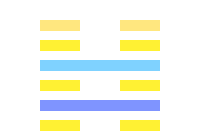
40.1.2.3.5 (40 > 49) - THE KIEH HEXAGRAM.
- 1. The first line, divided, shows that its subject will commit no error.
- 2. The second line, undivided, shows its subject catch, in hunting, three foxes, and obtain the yellow ( = golden) arrows. With firm correctness there will be good fortune.
- 3. The third line, divided, shows a porter with his burden, (yet) riding in a carriage. He will (only) tempt robbers to attack him. However firm and correct he may (try to) be, there will be cause for regret.
- 5. The fifth line, divided, shows (its subject), the superior man ( = the ruler), executing his function of removing (whatever is injurious to the idea of the hexagram), in which case there will be good fortune, and confidence in him will be shown even by the small men.
40.1.2.3.5 (40 > 49) - Demoralizing one's audience
One knows the solution but the others do not want to hear it.
Bing DeepL Google Yandex40.1.2.3.5 (40 > 49) - Demoralizing one's audience
One knows the solution but the others do not want to hear it.
Bing DeepL Google Yandex40.1.2.3.5 (40 > 49) - Kieh, la libération
Kieh : 1. Délivrer, faire échapper, échapper au danger ; 2. Disperser ; 3. Ouvrir, séparer, s’ouvrir. Se dit du mouvement de la germination. 4. Résoudre une difficulté, une complication.
-
1. Délivrer quelqu’un est chose excellente.
Quand le fort et le faible s’entendent selon la justice, il n’y a pas de faute à craindre. - 2. Délivrer est aussi heureux que, pour le chasseur, prendre trois renards et obtenir le prix, la flèche d’or. — Celui qui résout une difficulté, fait sortir d’une position difficile, est comme le chasseur qui prend trois renards et obtient la flèche d’or.
-
3. Si un porteur se met dans un char et qu’il survienne des voleurs, il sera attaqué et échappera difficilement ; s’il abandonne sa charge, il pourra se sauver.
Pour un porteur, aller en char est honteux ; c’est attirer sur soi les voleurs.
Il n’appartient pas à des gens du commun d’aller en char . - 5. C’est au sage d’écarter (les maux) et de résoudre (les difficultés) ; s’il y réussit, il gagnera la confiance du vulgaire.
40.1.2.3.5 (40 > 49) - Démoraliser son auditoire
On connaît la solution mais les autres ne veulent pas l'entendre.
Bing DeepL Google Yandex40.1.2.3.5 (40 > 49) - Módosítás
- 1. Fel akarja szabadítani magát, ez egy jó döntés.
- 2. Megkérik hogy válaszokat keressen mielőtt túl késő.
- 3. Ha valaki elhanyagolja, másoknak adja.
- 5. Csak egy alkalmas személy tudja megmutatni a megoldást.

40.4.5 (40 > 29) - THE KIEH HEXAGRAM.
- 4. (To the subject of) the fourth line, undivided, (it is said), ‘Remove your toes. Friends will (then) come, between you and whom there will be mutual confidence.’
- 5. The fifth line, divided, shows (its subject), the superior man ( = the ruler), executing his function of removing (whatever is injurious to the idea of the hexagram), in which case there will be good fortune, and confidence in him will be shown even by the small men.
40.4.5 (40 > 29) - Abandoning one' s support
One reflects on everything one has done to help those who have left without leaving an address.
Bing DeepL Google Yandex40.4.5 (40 > 29) - Abandoning one' s support
One reflects on everything one has done to help those who have left without leaving an address.
Bing DeepL Google Yandex40.4.5 (40 > 29) - Kieh, la libération
Kieh : 1. Délivrer, faire échapper, échapper au danger ; 2. Disperser ; 3. Ouvrir, séparer, s’ouvrir. Se dit du mouvement de la germination. 4. Résoudre une difficulté, une complication.
-
4. Échappez d’abord et après cela les amis viendront témoigner leur fidélité (sinon ils vous abandonnent).
Note. Le mot qui signifie ordinairement gros orteil est expliqué par les commentateurs comme ayant ici le sens de tchū, commencement, d’abord - 5. C’est au sage d’écarter (les maux) et de résoudre (les difficultés) ; s’il y réussit, il gagnera la confiance du vulgaire.
40.4.5 (40 > 29) - Abandonner ses soutiens
On repense à tout ce qu'on a fait pour aider ceux qui sont partis sans laisser d'adresse.
Bing DeepL Google Yandex40.4.5 (40 > 29) - Módosítás
- 4. Ajtók fognak megnyílni ha valaki felhagy a felesleges kényelemkereséssel.
- 5. Csak egy alkalmas személy tudja megmutatni a megoldást.

40.1.4.5 (40 > 60) - THE KIEH HEXAGRAM.
- 1. The first line, divided, shows that its subject will commit no error.
- 4. (To the subject of) the fourth line, undivided, (it is said), ‘Remove your toes. Friends will (then) come, between you and whom there will be mutual confidence.’
- 5. The fifth line, divided, shows (its subject), the superior man ( = the ruler), executing his function of removing (whatever is injurious to the idea of the hexagram), in which case there will be good fortune, and confidence in him will be shown even by the small men.
40.1.4.5 (40 > 60) - Defending one's borders
When one is smart, one does not let disorder set in.
Bing DeepL Google Yandex40.1.4.5 (40 > 60) - Defending one's borders
When one is smart, one does not let disorder set in.
Bing DeepL Google Yandex40.1.4.5 (40 > 60) - Kieh, la libération
Kieh : 1. Délivrer, faire échapper, échapper au danger ; 2. Disperser ; 3. Ouvrir, séparer, s’ouvrir. Se dit du mouvement de la germination. 4. Résoudre une difficulté, une complication.
-
1. Délivrer quelqu’un est chose excellente.
Quand le fort et le faible s’entendent selon la justice, il n’y a pas de faute à craindre. -
4. Échappez d’abord et après cela les amis viendront témoigner leur fidélité (sinon ils vous abandonnent).
Note. Le mot qui signifie ordinairement gros orteil est expliqué par les commentateurs comme ayant ici le sens de tchū, commencement, d’abord - 5. C’est au sage d’écarter (les maux) et de résoudre (les difficultés) ; s’il y réussit, il gagnera la confiance du vulgaire.
40.1.4.5 (40 > 60) - Défendre ses frontières
Quand on est intelligent on ne laisse pas le désordre s'installer.
Bing DeepL Google Yandex40.1.4.5 (40 > 60) - Módosítás
- 1. Fel akarja szabadítani magát, ez egy jó döntés.
- 4. Ajtók fognak megnyílni ha valaki felhagy a felesleges kényelemkereséssel.
- 5. Csak egy alkalmas személy tudja megmutatni a megoldást.
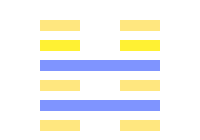
40.2.4.5 (40 > 8) - THE KIEH HEXAGRAM.
- 2. The second line, undivided, shows its subject catch, in hunting, three foxes, and obtain the yellow ( = golden) arrows. With firm correctness there will be good fortune.
- 4. (To the subject of) the fourth line, undivided, (it is said), ‘Remove your toes. Friends will (then) come, between you and whom there will be mutual confidence.’
- 5. The fifth line, divided, shows (its subject), the superior man ( = the ruler), executing his function of removing (whatever is injurious to the idea of the hexagram), in which case there will be good fortune, and confidence in him will be shown even by the small men.
40.2.4.5 (40 > 8) - Dominating by speech
One can end up believing what the others say when they express themselves skillfully.
Bing DeepL Google Yandex40.2.4.5 (40 > 8) - Dominating by speech
One can end up believing what the others say when they express themselves skillfully.
Bing DeepL Google Yandex40.2.4.5 (40 > 8) - Kieh, la libération
Kieh : 1. Délivrer, faire échapper, échapper au danger ; 2. Disperser ; 3. Ouvrir, séparer, s’ouvrir. Se dit du mouvement de la germination. 4. Résoudre une difficulté, une complication.
- 2. Délivrer est aussi heureux que, pour le chasseur, prendre trois renards et obtenir le prix, la flèche d’or. — Celui qui résout une difficulté, fait sortir d’une position difficile, est comme le chasseur qui prend trois renards et obtient la flèche d’or.
-
4. Échappez d’abord et après cela les amis viendront témoigner leur fidélité (sinon ils vous abandonnent).
Note. Le mot qui signifie ordinairement gros orteil est expliqué par les commentateurs comme ayant ici le sens de tchū, commencement, d’abord - 5. C’est au sage d’écarter (les maux) et de résoudre (les difficultés) ; s’il y réussit, il gagnera la confiance du vulgaire.
40.2.4.5 (40 > 8) - Dominer par la parole
On peut finir par croire ce que les autres disent quand ils s'expriment avec talent.
Bing DeepL Google Yandex40.2.4.5 (40 > 8) - Módosítás
- 2. Megkérik hogy válaszokat keressen mielőtt túl késő.
- 4. Ajtók fognak megnyílni ha valaki felhagy a felesleges kényelemkereséssel.
- 5. Csak egy alkalmas személy tudja megmutatni a megoldást.
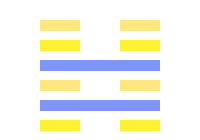
40.1.2.4.5 (40 > 3) - THE KIEH HEXAGRAM.
- 1. The first line, divided, shows that its subject will commit no error.
- 2. The second line, undivided, shows its subject catch, in hunting, three foxes, and obtain the yellow ( = golden) arrows. With firm correctness there will be good fortune.
- 4. (To the subject of) the fourth line, undivided, (it is said), ‘Remove your toes. Friends will (then) come, between you and whom there will be mutual confidence.’
- 5. The fifth line, divided, shows (its subject), the superior man ( = the ruler), executing his function of removing (whatever is injurious to the idea of the hexagram), in which case there will be good fortune, and confidence in him will be shown even by the small men.
40.1.2.4.5 (40 > 3) - Plundering the planet's resources
One digs into nature reserves to feed those who are not yet free from the need for comfort.
Bing DeepL Google Yandex40.1.2.4.5 (40 > 3) - Plundering the planet's resources
One digs into nature reserves to feed those who are not yet free from the need for comfort.
Bing DeepL Google Yandex40.1.2.4.5 (40 > 3) - Kieh, la libération
Kieh : 1. Délivrer, faire échapper, échapper au danger ; 2. Disperser ; 3. Ouvrir, séparer, s’ouvrir. Se dit du mouvement de la germination. 4. Résoudre une difficulté, une complication.
-
1. Délivrer quelqu’un est chose excellente.
Quand le fort et le faible s’entendent selon la justice, il n’y a pas de faute à craindre. - 2. Délivrer est aussi heureux que, pour le chasseur, prendre trois renards et obtenir le prix, la flèche d’or. — Celui qui résout une difficulté, fait sortir d’une position difficile, est comme le chasseur qui prend trois renards et obtient la flèche d’or.
-
4. Échappez d’abord et après cela les amis viendront témoigner leur fidélité (sinon ils vous abandonnent).
Note. Le mot qui signifie ordinairement gros orteil est expliqué par les commentateurs comme ayant ici le sens de tchū, commencement, d’abord - 5. C’est au sage d’écarter (les maux) et de résoudre (les difficultés) ; s’il y réussit, il gagnera la confiance du vulgaire.
40.1.2.4.5 (40 > 3) - Piller les ressources de la planète
On pioche dans les réserves naturelles pour alimenter ceux qui ne sont pas encore affranchis du besoin de confort.
Bing DeepL Google Yandex40.1.2.4.5 (40 > 3) - Módosítás
- 1. Fel akarja szabadítani magát, ez egy jó döntés.
- 2. Megkérik hogy válaszokat keressen mielőtt túl késő.
- 4. Ajtók fognak megnyílni ha valaki felhagy a felesleges kényelemkereséssel.
- 5. Csak egy alkalmas személy tudja megmutatni a megoldást.

40.3.4.5 (40 > 48) - THE KIEH HEXAGRAM.
- 3. The third line, divided, shows a porter with his burden, (yet) riding in a carriage. He will (only) tempt robbers to attack him. However firm and correct he may (try to) be, there will be cause for regret.
- 4. (To the subject of) the fourth line, undivided, (it is said), ‘Remove your toes. Friends will (then) come, between you and whom there will be mutual confidence.’
- 5. The fifth line, divided, shows (its subject), the superior man ( = the ruler), executing his function of removing (whatever is injurious to the idea of the hexagram), in which case there will be good fortune, and confidence in him will be shown even by the small men.
40.3.4.5 (40 > 48) - Detaching oneself from old interests
One regains freedom after having been conquered.
Bing DeepL Google Yandex40.3.4.5 (40 > 48) - Detaching oneself from old interests
One regains freedom after having been conquered.
Bing DeepL Google Yandex40.3.4.5 (40 > 48) - Kieh, la libération
Kieh : 1. Délivrer, faire échapper, échapper au danger ; 2. Disperser ; 3. Ouvrir, séparer, s’ouvrir. Se dit du mouvement de la germination. 4. Résoudre une difficulté, une complication.
-
3. Si un porteur se met dans un char et qu’il survienne des voleurs, il sera attaqué et échappera difficilement ; s’il abandonne sa charge, il pourra se sauver.
Pour un porteur, aller en char est honteux ; c’est attirer sur soi les voleurs.
Il n’appartient pas à des gens du commun d’aller en char . -
4. Échappez d’abord et après cela les amis viendront témoigner leur fidélité (sinon ils vous abandonnent).
Note. Le mot qui signifie ordinairement gros orteil est expliqué par les commentateurs comme ayant ici le sens de tchū, commencement, d’abord - 5. C’est au sage d’écarter (les maux) et de résoudre (les difficultés) ; s’il y réussit, il gagnera la confiance du vulgaire.
40.3.4.5 (40 > 48) - Se détacher de ses anciens intérêts
On reprend sa liberté après avoir été conquis.
Bing DeepL Google Yandex40.3.4.5 (40 > 48) - Módosítás
- 3. Ha valaki elhanyagolja, másoknak adja.
- 4. Ajtók fognak megnyílni ha valaki felhagy a felesleges kényelemkereséssel.
- 5. Csak egy alkalmas személy tudja megmutatni a megoldást.
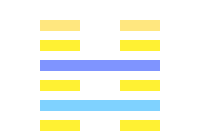
40.1.3.4.5 (40 > 5) - THE KIEH HEXAGRAM.
- 1. The first line, divided, shows that its subject will commit no error.
- 3. The third line, divided, shows a porter with his burden, (yet) riding in a carriage. He will (only) tempt robbers to attack him. However firm and correct he may (try to) be, there will be cause for regret.
- 4. (To the subject of) the fourth line, undivided, (it is said), ‘Remove your toes. Friends will (then) come, between you and whom there will be mutual confidence.’
- 5. The fifth line, divided, shows (its subject), the superior man ( = the ruler), executing his function of removing (whatever is injurious to the idea of the hexagram), in which case there will be good fortune, and confidence in him will be shown even by the small men.
40.1.3.4.5 (40 > 5) - Assuming one's responsibilities
One will be able to do what is necessary to avoid regretting having acquired rights.
Bing DeepL Google Yandex40.1.3.4.5 (40 > 5) - Assuming one's responsibilities
One will be able to do what is necessary to avoid regretting having acquired rights.
Bing DeepL Google Yandex40.1.3.4.5 (40 > 5) - Kieh, la libération
Kieh : 1. Délivrer, faire échapper, échapper au danger ; 2. Disperser ; 3. Ouvrir, séparer, s’ouvrir. Se dit du mouvement de la germination. 4. Résoudre une difficulté, une complication.
-
1. Délivrer quelqu’un est chose excellente.
Quand le fort et le faible s’entendent selon la justice, il n’y a pas de faute à craindre. -
3. Si un porteur se met dans un char et qu’il survienne des voleurs, il sera attaqué et échappera difficilement ; s’il abandonne sa charge, il pourra se sauver.
Pour un porteur, aller en char est honteux ; c’est attirer sur soi les voleurs.
Il n’appartient pas à des gens du commun d’aller en char . -
4. Échappez d’abord et après cela les amis viendront témoigner leur fidélité (sinon ils vous abandonnent).
Note. Le mot qui signifie ordinairement gros orteil est expliqué par les commentateurs comme ayant ici le sens de tchū, commencement, d’abord - 5. C’est au sage d’écarter (les maux) et de résoudre (les difficultés) ; s’il y réussit, il gagnera la confiance du vulgaire.
40.1.3.4.5 (40 > 5) - Assumer ses responsabilités
On saura faire le nécessaire pour ne pas avoir à regretter d'avoir acquis des droits.
Bing DeepL Google Yandex40.1.3.4.5 (40 > 5) - Módosítás
- 1. Fel akarja szabadítani magát, ez egy jó döntés.
- 3. Ha valaki elhanyagolja, másoknak adja.
- 4. Ajtók fognak megnyílni ha valaki felhagy a felesleges kényelemkereséssel.
- 5. Csak egy alkalmas személy tudja megmutatni a megoldást.
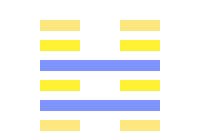
40.2.3.4.5 (40 > 39) - THE KIEH HEXAGRAM.
- 2. The second line, undivided, shows its subject catch, in hunting, three foxes, and obtain the yellow ( = golden) arrows. With firm correctness there will be good fortune.
- 3. The third line, divided, shows a porter with his burden, (yet) riding in a carriage. He will (only) tempt robbers to attack him. However firm and correct he may (try to) be, there will be cause for regret.
- 4. (To the subject of) the fourth line, undivided, (it is said), ‘Remove your toes. Friends will (then) come, between you and whom there will be mutual confidence.’
- 5. The fifth line, divided, shows (its subject), the superior man ( = the ruler), executing his function of removing (whatever is injurious to the idea of the hexagram), in which case there will be good fortune, and confidence in him will be shown even by the small men.
40.2.3.4.5 (40 > 39) - Complying with the established rule
One refuses to satisfy unusual requests.
Bing DeepL Google Yandex40.2.3.4.5 (40 > 39) - Complying with the established rule
One refuses to satisfy unusual requests.
Bing DeepL Google Yandex40.2.3.4.5 (40 > 39) - Kieh, la libération
Kieh : 1. Délivrer, faire échapper, échapper au danger ; 2. Disperser ; 3. Ouvrir, séparer, s’ouvrir. Se dit du mouvement de la germination. 4. Résoudre une difficulté, une complication.
- 2. Délivrer est aussi heureux que, pour le chasseur, prendre trois renards et obtenir le prix, la flèche d’or. — Celui qui résout une difficulté, fait sortir d’une position difficile, est comme le chasseur qui prend trois renards et obtient la flèche d’or.
-
3. Si un porteur se met dans un char et qu’il survienne des voleurs, il sera attaqué et échappera difficilement ; s’il abandonne sa charge, il pourra se sauver.
Pour un porteur, aller en char est honteux ; c’est attirer sur soi les voleurs.
Il n’appartient pas à des gens du commun d’aller en char . -
4. Échappez d’abord et après cela les amis viendront témoigner leur fidélité (sinon ils vous abandonnent).
Note. Le mot qui signifie ordinairement gros orteil est expliqué par les commentateurs comme ayant ici le sens de tchū, commencement, d’abord - 5. C’est au sage d’écarter (les maux) et de résoudre (les difficultés) ; s’il y réussit, il gagnera la confiance du vulgaire.
40.2.3.4.5 (40 > 39) - Se conformer à la règle établie
On refuse de satisfaire des demandes inhabituelles.
Bing DeepL Google Yandex40.2.3.4.5 (40 > 39) - Módosítás
- 2. Megkérik hogy válaszokat keressen mielőtt túl késő.
- 3. Ha valaki elhanyagolja, másoknak adja.
- 4. Ajtók fognak megnyílni ha valaki felhagy a felesleges kényelemkereséssel.
- 5. Csak egy alkalmas személy tudja megmutatni a megoldást.
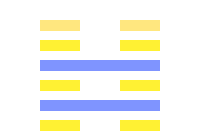
40.1.2.3.4.5 (40 > 63) - THE KIEH HEXAGRAM.
- 1. The first line, divided, shows that its subject will commit no error.
- 2. The second line, undivided, shows its subject catch, in hunting, three foxes, and obtain the yellow ( = golden) arrows. With firm correctness there will be good fortune.
- 3. The third line, divided, shows a porter with his burden, (yet) riding in a carriage. He will (only) tempt robbers to attack him. However firm and correct he may (try to) be, there will be cause for regret.
- 4. (To the subject of) the fourth line, undivided, (it is said), ‘Remove your toes. Friends will (then) come, between you and whom there will be mutual confidence.’
- 5. The fifth line, divided, shows (its subject), the superior man ( = the ruler), executing his function of removing (whatever is injurious to the idea of the hexagram), in which case there will be good fortune, and confidence in him will be shown even by the small men.
40.1.2.3.4.5 (40 > 63) - Behaving
One has respect for those who can take everything one has.
Bing DeepL Google Yandex40.1.2.3.4.5 (40 > 63) - Behaving
One has respect for those who can take everything one has.
Bing DeepL Google Yandex40.1.2.3.4.5 (40 > 63) - Kieh, la libération
Kieh : 1. Délivrer, faire échapper, échapper au danger ; 2. Disperser ; 3. Ouvrir, séparer, s’ouvrir. Se dit du mouvement de la germination. 4. Résoudre une difficulté, une complication.
-
1. Délivrer quelqu’un est chose excellente.
Quand le fort et le faible s’entendent selon la justice, il n’y a pas de faute à craindre. - 2. Délivrer est aussi heureux que, pour le chasseur, prendre trois renards et obtenir le prix, la flèche d’or. — Celui qui résout une difficulté, fait sortir d’une position difficile, est comme le chasseur qui prend trois renards et obtient la flèche d’or.
-
3. Si un porteur se met dans un char et qu’il survienne des voleurs, il sera attaqué et échappera difficilement ; s’il abandonne sa charge, il pourra se sauver.
Pour un porteur, aller en char est honteux ; c’est attirer sur soi les voleurs.
Il n’appartient pas à des gens du commun d’aller en char . -
4. Échappez d’abord et après cela les amis viendront témoigner leur fidélité (sinon ils vous abandonnent).
Note. Le mot qui signifie ordinairement gros orteil est expliqué par les commentateurs comme ayant ici le sens de tchū, commencement, d’abord - 5. C’est au sage d’écarter (les maux) et de résoudre (les difficultés) ; s’il y réussit, il gagnera la confiance du vulgaire.
40.1.2.3.4.5 (40 > 63) - Se tenir à carreaux
On a du respect envers ceux qui peuvent prendre tout ce qu'on possède.
Bing DeepL Google Yandex40.1.2.3.4.5 (40 > 63) - Módosítás
- 1. Fel akarja szabadítani magát, ez egy jó döntés.
- 2. Megkérik hogy válaszokat keressen mielőtt túl késő.
- 3. Ha valaki elhanyagolja, másoknak adja.
- 4. Ajtók fognak megnyílni ha valaki felhagy a felesleges kényelemkereséssel.
- 5. Csak egy alkalmas személy tudja megmutatni a megoldást.
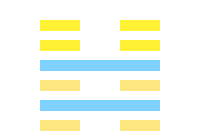
40.5.6 (40 > 6) - THE KIEH HEXAGRAM.
- 5. The fifth line, divided, shows (its subject), the superior man ( = the ruler), executing his function of removing (whatever is injurious to the idea of the hexagram), in which case there will be good fortune, and confidence in him will be shown even by the small men.
- 6. In the sixth line, divided, we see a feudal prince (with his bow) shooting at a falcon on the top of a high wall, and hitting it. (The effect of his action) will be in every way advantageous.
40.5.6 (40 > 6) - Preventing others from fulfilling their dreams
One experiences difficulties to free oneself from remorse.
Bing DeepL Google Yandex40.5.6 (40 > 6) - Preventing others from fulfilling their dreams
One experiences difficulties to free oneself from remorse.
Bing DeepL Google Yandex40.5.6 (40 > 6) - Kieh, la libération
Kieh : 1. Délivrer, faire échapper, échapper au danger ; 2. Disperser ; 3. Ouvrir, séparer, s’ouvrir. Se dit du mouvement de la germination. 4. Résoudre une difficulté, une complication.
- 5. C’est au sage d’écarter (les maux) et de résoudre (les difficultés) ; s’il y réussit, il gagnera la confiance du vulgaire.
- 6. Si le prince est assez habile pour atteindre d’une flèche un faucon posé sur le haut d’un mur élevé, il aura le succès et saura disperser les rebelles.
40.5.6 (40 > 6) - Empêcher les autres d'accomplir leurs rêves
On éprouve des difficultés à se libérer de ses remords.
Bing DeepL Google Yandex40.5.6 (40 > 6) - Módosítás
- 5. Csak egy alkalmas személy tudja megmutatni a megoldást.
- 6. Miután felkészül, meg tudja oldani a problémákat időben.
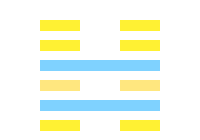
40.1.5.6 (40 > 10) - THE KIEH HEXAGRAM.
- 1. The first line, divided, shows that its subject will commit no error.
- 5. The fifth line, divided, shows (its subject), the superior man ( = the ruler), executing his function of removing (whatever is injurious to the idea of the hexagram), in which case there will be good fortune, and confidence in him will be shown even by the small men.
- 6. In the sixth line, divided, we see a feudal prince (with his bow) shooting at a falcon on the top of a high wall, and hitting it. (The effect of his action) will be in every way advantageous.
40.1.5.6 (40 > 10) - Not wanting to interfere
One keeps away from those who want to walk without being recognised.
Bing DeepL Google Yandex40.1.5.6 (40 > 10) - Not wanting to interfere
One keeps away from those who want to walk without being recognized.
Bing DeepL Google Yandex40.1.5.6 (40 > 10) - Kieh, la libération
Kieh : 1. Délivrer, faire échapper, échapper au danger ; 2. Disperser ; 3. Ouvrir, séparer, s’ouvrir. Se dit du mouvement de la germination. 4. Résoudre une difficulté, une complication.
-
1. Délivrer quelqu’un est chose excellente.
Quand le fort et le faible s’entendent selon la justice, il n’y a pas de faute à craindre. - 5. C’est au sage d’écarter (les maux) et de résoudre (les difficultés) ; s’il y réussit, il gagnera la confiance du vulgaire.
- 6. Si le prince est assez habile pour atteindre d’une flèche un faucon posé sur le haut d’un mur élevé, il aura le succès et saura disperser les rebelles.
40.1.5.6 (40 > 10) - Ne pas vouloir gêner
On se tient à distance de ceux qui veulent marcher sans être reconnus.
Bing DeepL Google Yandex40.1.5.6 (40 > 10) - Módosítás
- 1. Fel akarja szabadítani magát, ez egy jó döntés.
- 5. Csak egy alkalmas személy tudja megmutatni a megoldást.
- 6. Miután felkészül, meg tudja oldani a problémákat időben.

40.2.5.6 (40 > 12) - THE KIEH HEXAGRAM.
- 2. The second line, undivided, shows its subject catch, in hunting, three foxes, and obtain the yellow ( = golden) arrows. With firm correctness there will be good fortune.
- 5. The fifth line, divided, shows (its subject), the superior man ( = the ruler), executing his function of removing (whatever is injurious to the idea of the hexagram), in which case there will be good fortune, and confidence in him will be shown even by the small men.
- 6. In the sixth line, divided, we see a feudal prince (with his bow) shooting at a falcon on the top of a high wall, and hitting it. (The effect of his action) will be in every way advantageous.
40.2.5.6 (40 > 12) - Defending one's backyard
One prefers to help those with whom they agree.
Bing DeepL Google Yandex40.2.5.6 (40 > 12) - Defending one's backyard
One prefers to help those with whom they agree.
Bing DeepL Google Yandex40.2.5.6 (40 > 12) - Kieh, la libération
Kieh : 1. Délivrer, faire échapper, échapper au danger ; 2. Disperser ; 3. Ouvrir, séparer, s’ouvrir. Se dit du mouvement de la germination. 4. Résoudre une difficulté, une complication.
- 2. Délivrer est aussi heureux que, pour le chasseur, prendre trois renards et obtenir le prix, la flèche d’or. — Celui qui résout une difficulté, fait sortir d’une position difficile, est comme le chasseur qui prend trois renards et obtient la flèche d’or.
- 5. C’est au sage d’écarter (les maux) et de résoudre (les difficultés) ; s’il y réussit, il gagnera la confiance du vulgaire.
- 6. Si le prince est assez habile pour atteindre d’une flèche un faucon posé sur le haut d’un mur élevé, il aura le succès et saura disperser les rebelles.
40.2.5.6 (40 > 12) - Défendre son pré carré
On préfère aider ceux avec qui on est d’accord.
Bing DeepL Google Yandex40.2.5.6 (40 > 12) - Módosítás
- 2. Megkérik hogy válaszokat keressen mielőtt túl késő.
- 5. Csak egy alkalmas személy tudja megmutatni a megoldást.
- 6. Miután felkészül, meg tudja oldani a problémákat időben.

40.1.2.5.6 (40 > 25) - THE KIEH HEXAGRAM.
- 1. The first line, divided, shows that its subject will commit no error.
- 2. The second line, undivided, shows its subject catch, in hunting, three foxes, and obtain the yellow ( = golden) arrows. With firm correctness there will be good fortune.
- 5. The fifth line, divided, shows (its subject), the superior man ( = the ruler), executing his function of removing (whatever is injurious to the idea of the hexagram), in which case there will be good fortune, and confidence in him will be shown even by the small men.
- 6. In the sixth line, divided, we see a feudal prince (with his bow) shooting at a falcon on the top of a high wall, and hitting it. (The effect of his action) will be in every way advantageous.
40.1.2.5.6 (40 > 25) - Weaving a cocoon
One prepares real plasters to protect those at risk of injury.
Bing DeepL Google Yandex40.1.2.5.6 (40 > 25) - Weaving a cocoon
One prepares real plasters to protect those at risk of injury.
Bing DeepL Google Yandex40.1.2.5.6 (40 > 25) - Kieh, la libération
Kieh : 1. Délivrer, faire échapper, échapper au danger ; 2. Disperser ; 3. Ouvrir, séparer, s’ouvrir. Se dit du mouvement de la germination. 4. Résoudre une difficulté, une complication.
-
1. Délivrer quelqu’un est chose excellente.
Quand le fort et le faible s’entendent selon la justice, il n’y a pas de faute à craindre. - 2. Délivrer est aussi heureux que, pour le chasseur, prendre trois renards et obtenir le prix, la flèche d’or. — Celui qui résout une difficulté, fait sortir d’une position difficile, est comme le chasseur qui prend trois renards et obtient la flèche d’or.
- 5. C’est au sage d’écarter (les maux) et de résoudre (les difficultés) ; s’il y réussit, il gagnera la confiance du vulgaire.
- 6. Si le prince est assez habile pour atteindre d’une flèche un faucon posé sur le haut d’un mur élevé, il aura le succès et saura disperser les rebelles.
40.1.2.5.6 (40 > 25) - Tisser un cocon
On prépare de vrais emplâtres pour protéger ceux qui risquent d'être blessés.
Bing DeepL Google Yandex40.1.2.5.6 (40 > 25) - Módosítás
- 1. Fel akarja szabadítani magát, ez egy jó döntés.
- 2. Megkérik hogy válaszokat keressen mielőtt túl késő.
- 5. Csak egy alkalmas személy tudja megmutatni a megoldást.
- 6. Miután felkészül, meg tudja oldani a problémákat időben.
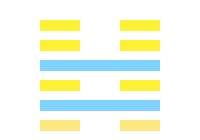
40.3.5.6 (40 > 44) - THE KIEH HEXAGRAM.
- 3. The third line, divided, shows a porter with his burden, (yet) riding in a carriage. He will (only) tempt robbers to attack him. However firm and correct he may (try to) be, there will be cause for regret.
- 5. The fifth line, divided, shows (its subject), the superior man ( = the ruler), executing his function of removing (whatever is injurious to the idea of the hexagram), in which case there will be good fortune, and confidence in him will be shown even by the small men.
- 6. In the sixth line, divided, we see a feudal prince (with his bow) shooting at a falcon on the top of a high wall, and hitting it. (The effect of his action) will be in every way advantageous.
40.3.5.6 (40 > 44) - Suspecting a lack of attention
One realises that others are not going to do what they have been asked to do.
Bing DeepL Google Yandex40.3.5.6 (40 > 44) - Suspecting a lack of attention
One realizes that others are not going to do what they have been asked to do.
Bing DeepL Google Yandex40.3.5.6 (40 > 44) - Kieh, la libération
Kieh : 1. Délivrer, faire échapper, échapper au danger ; 2. Disperser ; 3. Ouvrir, séparer, s’ouvrir. Se dit du mouvement de la germination. 4. Résoudre une difficulté, une complication.
-
3. Si un porteur se met dans un char et qu’il survienne des voleurs, il sera attaqué et échappera difficilement ; s’il abandonne sa charge, il pourra se sauver.
Pour un porteur, aller en char est honteux ; c’est attirer sur soi les voleurs.
Il n’appartient pas à des gens du commun d’aller en char . - 5. C’est au sage d’écarter (les maux) et de résoudre (les difficultés) ; s’il y réussit, il gagnera la confiance du vulgaire.
- 6. Si le prince est assez habile pour atteindre d’une flèche un faucon posé sur le haut d’un mur élevé, il aura le succès et saura disperser les rebelles.
40.3.5.6 (40 > 44) - Soupçonner un manque d'attention
On réalise que les autres ne vont pas faire ce qu'on leur a demandé.
Bing DeepL Google Yandex40.3.5.6 (40 > 44) - Módosítás
- 3. Ha valaki elhanyagolja, másoknak adja.
- 5. Csak egy alkalmas személy tudja megmutatni a megoldást.
- 6. Miután felkészül, meg tudja oldani a problémákat időben.
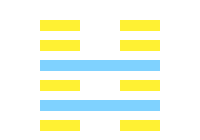
40.1.3.5.6 (40 > 1) - THE KIEH HEXAGRAM.
- 1. The first line, divided, shows that its subject will commit no error.
- 3. The third line, divided, shows a porter with his burden, (yet) riding in a carriage. He will (only) tempt robbers to attack him. However firm and correct he may (try to) be, there will be cause for regret.
- 5. The fifth line, divided, shows (its subject), the superior man ( = the ruler), executing his function of removing (whatever is injurious to the idea of the hexagram), in which case there will be good fortune, and confidence in him will be shown even by the small men.
- 6. In the sixth line, divided, we see a feudal prince (with his bow) shooting at a falcon on the top of a high wall, and hitting it. (The effect of his action) will be in every way advantageous.
40.1.3.5.6 (40 > 1) - Lacking preparation
One has done the best they could but it is not enough.
Bing DeepL Google Yandex40.1.3.5.6 (40 > 1) - Lacking preparation
One has done the best they could but it is not enough.
Bing DeepL Google Yandex40.1.3.5.6 (40 > 1) - Kieh, la libération
Kieh : 1. Délivrer, faire échapper, échapper au danger ; 2. Disperser ; 3. Ouvrir, séparer, s’ouvrir. Se dit du mouvement de la germination. 4. Résoudre une difficulté, une complication.
-
1. Délivrer quelqu’un est chose excellente.
Quand le fort et le faible s’entendent selon la justice, il n’y a pas de faute à craindre. -
3. Si un porteur se met dans un char et qu’il survienne des voleurs, il sera attaqué et échappera difficilement ; s’il abandonne sa charge, il pourra se sauver.
Pour un porteur, aller en char est honteux ; c’est attirer sur soi les voleurs.
Il n’appartient pas à des gens du commun d’aller en char . - 5. C’est au sage d’écarter (les maux) et de résoudre (les difficultés) ; s’il y réussit, il gagnera la confiance du vulgaire.
- 6. Si le prince est assez habile pour atteindre d’une flèche un faucon posé sur le haut d’un mur élevé, il aura le succès et saura disperser les rebelles.
40.1.3.5.6 (40 > 1) - Manquer de préparation
On a fait du mieux que l’on pouvait mais ce n’est pas suffisant.
Bing DeepL Google Yandex40.1.3.5.6 (40 > 1) - Módosítás
- 1. Fel akarja szabadítani magát, ez egy jó döntés.
- 3. Ha valaki elhanyagolja, másoknak adja.
- 5. Csak egy alkalmas személy tudja megmutatni a megoldást.
- 6. Miután felkészül, meg tudja oldani a problémákat időben.
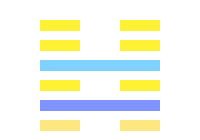
40.2.3.5.6 (40 > 33) - THE KIEH HEXAGRAM.
- 2. The second line, undivided, shows its subject catch, in hunting, three foxes, and obtain the yellow ( = golden) arrows. With firm correctness there will be good fortune.
- 3. The third line, divided, shows a porter with his burden, (yet) riding in a carriage. He will (only) tempt robbers to attack him. However firm and correct he may (try to) be, there will be cause for regret.
- 5. The fifth line, divided, shows (its subject), the superior man ( = the ruler), executing his function of removing (whatever is injurious to the idea of the hexagram), in which case there will be good fortune, and confidence in him will be shown even by the small men.
- 6. In the sixth line, divided, we see a feudal prince (with his bow) shooting at a falcon on the top of a high wall, and hitting it. (The effect of his action) will be in every way advantageous.
40.2.3.5.6 (40 > 33) - Consolidating the wall
One is rebuilding to be able to face the next wave.
Bing DeepL Google Yandex40.2.3.5.6 (40 > 33) - Consolidating the wall
One is rebuilding to be able to face the next wave.
Bing DeepL Google Yandex40.2.3.5.6 (40 > 33) - Kieh, la libération
Kieh : 1. Délivrer, faire échapper, échapper au danger ; 2. Disperser ; 3. Ouvrir, séparer, s’ouvrir. Se dit du mouvement de la germination. 4. Résoudre une difficulté, une complication.
- 2. Délivrer est aussi heureux que, pour le chasseur, prendre trois renards et obtenir le prix, la flèche d’or. — Celui qui résout une difficulté, fait sortir d’une position difficile, est comme le chasseur qui prend trois renards et obtient la flèche d’or.
-
3. Si un porteur se met dans un char et qu’il survienne des voleurs, il sera attaqué et échappera difficilement ; s’il abandonne sa charge, il pourra se sauver.
Pour un porteur, aller en char est honteux ; c’est attirer sur soi les voleurs.
Il n’appartient pas à des gens du commun d’aller en char . - 5. C’est au sage d’écarter (les maux) et de résoudre (les difficultés) ; s’il y réussit, il gagnera la confiance du vulgaire.
- 6. Si le prince est assez habile pour atteindre d’une flèche un faucon posé sur le haut d’un mur élevé, il aura le succès et saura disperser les rebelles.
40.2.3.5.6 (40 > 33) - Consolider le mur
On se reconstruit pour être en capacité d'affronter la prochaine vague.
Bing DeepL Google Yandex40.2.3.5.6 (40 > 33) - Módosítás
- 2. Megkérik hogy válaszokat keressen mielőtt túl késő.
- 3. Ha valaki elhanyagolja, másoknak adja.
- 5. Csak egy alkalmas személy tudja megmutatni a megoldást.
- 6. Miután felkészül, meg tudja oldani a problémákat időben.
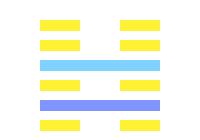
40.1.2.3.5.6 (40 > 13) - THE KIEH HEXAGRAM.
- 1. The first line, divided, shows that its subject will commit no error.
- 2. The second line, undivided, shows its subject catch, in hunting, three foxes, and obtain the yellow ( = golden) arrows. With firm correctness there will be good fortune.
- 3. The third line, divided, shows a porter with his burden, (yet) riding in a carriage. He will (only) tempt robbers to attack him. However firm and correct he may (try to) be, there will be cause for regret.
- 5. The fifth line, divided, shows (its subject), the superior man ( = the ruler), executing his function of removing (whatever is injurious to the idea of the hexagram), in which case there will be good fortune, and confidence in him will be shown even by the small men.
- 6. In the sixth line, divided, we see a feudal prince (with his bow) shooting at a falcon on the top of a high wall, and hitting it. (The effect of his action) will be in every way advantageous.
40.1.2.3.5.6 (40 > 13) - Abdicating
One tells one's friends when one can't do what they wanted.
Bing DeepL Google Yandex40.1.2.3.5.6 (40 > 13) - Abdicating
One tells one's friends when one can't do what they wanted.
Bing DeepL Google Yandex40.1.2.3.5.6 (40 > 13) - Kieh, la libération
Kieh : 1. Délivrer, faire échapper, échapper au danger ; 2. Disperser ; 3. Ouvrir, séparer, s’ouvrir. Se dit du mouvement de la germination. 4. Résoudre une difficulté, une complication.
-
1. Délivrer quelqu’un est chose excellente.
Quand le fort et le faible s’entendent selon la justice, il n’y a pas de faute à craindre. - 2. Délivrer est aussi heureux que, pour le chasseur, prendre trois renards et obtenir le prix, la flèche d’or. — Celui qui résout une difficulté, fait sortir d’une position difficile, est comme le chasseur qui prend trois renards et obtient la flèche d’or.
-
3. Si un porteur se met dans un char et qu’il survienne des voleurs, il sera attaqué et échappera difficilement ; s’il abandonne sa charge, il pourra se sauver.
Pour un porteur, aller en char est honteux ; c’est attirer sur soi les voleurs.
Il n’appartient pas à des gens du commun d’aller en char . - 5. C’est au sage d’écarter (les maux) et de résoudre (les difficultés) ; s’il y réussit, il gagnera la confiance du vulgaire.
- 6. Si le prince est assez habile pour atteindre d’une flèche un faucon posé sur le haut d’un mur élevé, il aura le succès et saura disperser les rebelles.
40.1.2.3.5.6 (40 > 13) - Se défausser
On prévient ses amis quand on n'est pas en capacité de faire ce qu'ils avaient souhaité.
Bing DeepL Google Yandex40.1.2.3.5.6 (40 > 13) - Módosítás
- 1. Fel akarja szabadítani magát, ez egy jó döntés.
- 2. Megkérik hogy válaszokat keressen mielőtt túl késő.
- 3. Ha valaki elhanyagolja, másoknak adja.
- 5. Csak egy alkalmas személy tudja megmutatni a megoldást.
- 6. Miután felkészül, meg tudja oldani a problémákat időben.

40.4.5.6 (40 > 59) - THE KIEH HEXAGRAM.
- 4. (To the subject of) the fourth line, undivided, (it is said), ‘Remove your toes. Friends will (then) come, between you and whom there will be mutual confidence.’
- 5. The fifth line, divided, shows (its subject), the superior man ( = the ruler), executing his function of removing (whatever is injurious to the idea of the hexagram), in which case there will be good fortune, and confidence in him will be shown even by the small men.
- 6. In the sixth line, divided, we see a feudal prince (with his bow) shooting at a falcon on the top of a high wall, and hitting it. (The effect of his action) will be in every way advantageous.
40.4.5.6 (40 > 59) - Building subscriber loyalty
One is soothed at the sight of a majestic work.
Bing DeepL Google Yandex40.4.5.6 (40 > 59) - Building subscriber loyalty
One is soothed at the sight of a majestic work.
Bing DeepL Google Yandex40.4.5.6 (40 > 59) - Kieh, la libération
Kieh : 1. Délivrer, faire échapper, échapper au danger ; 2. Disperser ; 3. Ouvrir, séparer, s’ouvrir. Se dit du mouvement de la germination. 4. Résoudre une difficulté, une complication.
-
4. Échappez d’abord et après cela les amis viendront témoigner leur fidélité (sinon ils vous abandonnent).
Note. Le mot qui signifie ordinairement gros orteil est expliqué par les commentateurs comme ayant ici le sens de tchū, commencement, d’abord - 5. C’est au sage d’écarter (les maux) et de résoudre (les difficultés) ; s’il y réussit, il gagnera la confiance du vulgaire.
- 6. Si le prince est assez habile pour atteindre d’une flèche un faucon posé sur le haut d’un mur élevé, il aura le succès et saura disperser les rebelles.
40.4.5.6 (40 > 59) - Fidéliser ses abonnés
On se tranquillise à la vue d'une œuvre majestueuse.
Bing DeepL Google Yandex40.4.5.6 (40 > 59) - Módosítás
- 4. Ajtók fognak megnyílni ha valaki felhagy a felesleges kényelemkereséssel.
- 5. Csak egy alkalmas személy tudja megmutatni a megoldást.
- 6. Miután felkészül, meg tudja oldani a problémákat időben.

40.1.4.5.6 (40 > 61) - THE KIEH HEXAGRAM.
- 1. The first line, divided, shows that its subject will commit no error.
- 4. (To the subject of) the fourth line, undivided, (it is said), ‘Remove your toes. Friends will (then) come, between you and whom there will be mutual confidence.’
- 5. The fifth line, divided, shows (its subject), the superior man ( = the ruler), executing his function of removing (whatever is injurious to the idea of the hexagram), in which case there will be good fortune, and confidence in him will be shown even by the small men.
- 6. In the sixth line, divided, we see a feudal prince (with his bow) shooting at a falcon on the top of a high wall, and hitting it. (The effect of his action) will be in every way advantageous.
40.1.4.5.6 (40 > 61) - Being relieved of a great weight
One is breathing a little better now that the others are gone.
Bing DeepL Google Yandex40.1.4.5.6 (40 > 61) - Being relieved of a great weight
One is breathing a little better now that the others are gone.
Bing DeepL Google Yandex40.1.4.5.6 (40 > 61) - Kieh, la libération
Kieh : 1. Délivrer, faire échapper, échapper au danger ; 2. Disperser ; 3. Ouvrir, séparer, s’ouvrir. Se dit du mouvement de la germination. 4. Résoudre une difficulté, une complication.
-
1. Délivrer quelqu’un est chose excellente.
Quand le fort et le faible s’entendent selon la justice, il n’y a pas de faute à craindre. -
4. Échappez d’abord et après cela les amis viendront témoigner leur fidélité (sinon ils vous abandonnent).
Note. Le mot qui signifie ordinairement gros orteil est expliqué par les commentateurs comme ayant ici le sens de tchū, commencement, d’abord - 5. C’est au sage d’écarter (les maux) et de résoudre (les difficultés) ; s’il y réussit, il gagnera la confiance du vulgaire.
- 6. Si le prince est assez habile pour atteindre d’une flèche un faucon posé sur le haut d’un mur élevé, il aura le succès et saura disperser les rebelles.
40.1.4.5.6 (40 > 61) - Être soulagé d'un grand poids
On respire un peu mieux depuis que les autres sont partis.
Bing DeepL Google Yandex40.1.4.5.6 (40 > 61) - Módosítás
- 1. Fel akarja szabadítani magát, ez egy jó döntés.
- 4. Ajtók fognak megnyílni ha valaki felhagy a felesleges kényelemkereséssel.
- 5. Csak egy alkalmas személy tudja megmutatni a megoldást.
- 6. Miután felkészül, meg tudja oldani a problémákat időben.
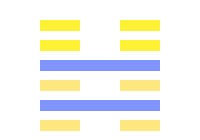
40.2.4.5.6 (40 > 20) - THE KIEH HEXAGRAM.
- 2. The second line, undivided, shows its subject catch, in hunting, three foxes, and obtain the yellow ( = golden) arrows. With firm correctness there will be good fortune.
- 4. (To the subject of) the fourth line, undivided, (it is said), ‘Remove your toes. Friends will (then) come, between you and whom there will be mutual confidence.’
- 5. The fifth line, divided, shows (its subject), the superior man ( = the ruler), executing his function of removing (whatever is injurious to the idea of the hexagram), in which case there will be good fortune, and confidence in him will be shown even by the small men.
- 6. In the sixth line, divided, we see a feudal prince (with his bow) shooting at a falcon on the top of a high wall, and hitting it. (The effect of his action) will be in every way advantageous.
40.2.4.5.6 (40 > 20) - Going with one's instincts
One must part with a sense of embarrassment.
Bing DeepL Google Yandex40.2.4.5.6 (40 > 20) - Going with one's instincts
One must part with a sense of embarrassment.
Bing DeepL Google Yandex40.2.4.5.6 (40 > 20) - Kieh, la libération
Kieh : 1. Délivrer, faire échapper, échapper au danger ; 2. Disperser ; 3. Ouvrir, séparer, s’ouvrir. Se dit du mouvement de la germination. 4. Résoudre une difficulté, une complication.
- 2. Délivrer est aussi heureux que, pour le chasseur, prendre trois renards et obtenir le prix, la flèche d’or. — Celui qui résout une difficulté, fait sortir d’une position difficile, est comme le chasseur qui prend trois renards et obtient la flèche d’or.
-
4. Échappez d’abord et après cela les amis viendront témoigner leur fidélité (sinon ils vous abandonnent).
Note. Le mot qui signifie ordinairement gros orteil est expliqué par les commentateurs comme ayant ici le sens de tchū, commencement, d’abord - 5. C’est au sage d’écarter (les maux) et de résoudre (les difficultés) ; s’il y réussit, il gagnera la confiance du vulgaire.
- 6. Si le prince est assez habile pour atteindre d’une flèche un faucon posé sur le haut d’un mur élevé, il aura le succès et saura disperser les rebelles.
40.2.4.5.6 (40 > 20) - Suivre son instinct
On doit se séparer d'un sentiment de gêne.
Bing DeepL Google Yandex40.2.4.5.6 (40 > 20) - Módosítás
- 2. Megkérik hogy válaszokat keressen mielőtt túl késő.
- 4. Ajtók fognak megnyílni ha valaki felhagy a felesleges kényelemkereséssel.
- 5. Csak egy alkalmas személy tudja megmutatni a megoldást.
- 6. Miután felkészül, meg tudja oldani a problémákat időben.
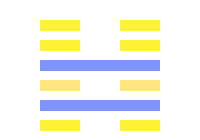
40.1.2.4.5.6 (40 > 42) - THE KIEH HEXAGRAM.
- 1. The first line, divided, shows that its subject will commit no error.
- 2. The second line, undivided, shows its subject catch, in hunting, three foxes, and obtain the yellow ( = golden) arrows. With firm correctness there will be good fortune.
- 4. (To the subject of) the fourth line, undivided, (it is said), ‘Remove your toes. Friends will (then) come, between you and whom there will be mutual confidence.’
- 5. The fifth line, divided, shows (its subject), the superior man ( = the ruler), executing his function of removing (whatever is injurious to the idea of the hexagram), in which case there will be good fortune, and confidence in him will be shown even by the small men.
- 6. In the sixth line, divided, we see a feudal prince (with his bow) shooting at a falcon on the top of a high wall, and hitting it. (The effect of his action) will be in every way advantageous.
40.1.2.4.5.6 (40 > 42) - Rooting out the evil
One is totally involved so that others would act quickly.
Bing DeepL Google Yandex40.1.2.4.5.6 (40 > 42) - Rooting out the evil
One is totally involved so that others would act quickly.
Bing DeepL Google Yandex40.1.2.4.5.6 (40 > 42) - Kieh, la libération
Kieh : 1. Délivrer, faire échapper, échapper au danger ; 2. Disperser ; 3. Ouvrir, séparer, s’ouvrir. Se dit du mouvement de la germination. 4. Résoudre une difficulté, une complication.
-
1. Délivrer quelqu’un est chose excellente.
Quand le fort et le faible s’entendent selon la justice, il n’y a pas de faute à craindre. - 2. Délivrer est aussi heureux que, pour le chasseur, prendre trois renards et obtenir le prix, la flèche d’or. — Celui qui résout une difficulté, fait sortir d’une position difficile, est comme le chasseur qui prend trois renards et obtient la flèche d’or.
-
4. Échappez d’abord et après cela les amis viendront témoigner leur fidélité (sinon ils vous abandonnent).
Note. Le mot qui signifie ordinairement gros orteil est expliqué par les commentateurs comme ayant ici le sens de tchū, commencement, d’abord - 5. C’est au sage d’écarter (les maux) et de résoudre (les difficultés) ; s’il y réussit, il gagnera la confiance du vulgaire.
- 6. Si le prince est assez habile pour atteindre d’une flèche un faucon posé sur le haut d’un mur élevé, il aura le succès et saura disperser les rebelles.
40.1.2.4.5.6 (40 > 42) - Crever l'abcès
On est totalement impliqué pour que les autres fassent vite.
Bing DeepL Google Yandex40.1.2.4.5.6 (40 > 42) - Módosítás
- 1. Fel akarja szabadítani magát, ez egy jó döntés.
- 2. Megkérik hogy válaszokat keressen mielőtt túl késő.
- 4. Ajtók fognak megnyílni ha valaki felhagy a felesleges kényelemkereséssel.
- 5. Csak egy alkalmas személy tudja megmutatni a megoldást.
- 6. Miután felkészül, meg tudja oldani a problémákat időben.

40.3.4.5.6 (40 > 57) - THE KIEH HEXAGRAM.
- 3. The third line, divided, shows a porter with his burden, (yet) riding in a carriage. He will (only) tempt robbers to attack him. However firm and correct he may (try to) be, there will be cause for regret.
- 4. (To the subject of) the fourth line, undivided, (it is said), ‘Remove your toes. Friends will (then) come, between you and whom there will be mutual confidence.’
- 5. The fifth line, divided, shows (its subject), the superior man ( = the ruler), executing his function of removing (whatever is injurious to the idea of the hexagram), in which case there will be good fortune, and confidence in him will be shown even by the small men.
- 6. In the sixth line, divided, we see a feudal prince (with his bow) shooting at a falcon on the top of a high wall, and hitting it. (The effect of his action) will be in every way advantageous.
40.3.4.5.6 (40 > 57) - Taming with sweetness
One prepares more snacks for others to regain strength.
Bing DeepL Google Yandex40.3.4.5.6 (40 > 57) - Taming with sweetness
One prepares more snacks for others to regain strength.
Bing DeepL Google Yandex40.3.4.5.6 (40 > 57) - Kieh, la libération
Kieh : 1. Délivrer, faire échapper, échapper au danger ; 2. Disperser ; 3. Ouvrir, séparer, s’ouvrir. Se dit du mouvement de la germination. 4. Résoudre une difficulté, une complication.
-
3. Si un porteur se met dans un char et qu’il survienne des voleurs, il sera attaqué et échappera difficilement ; s’il abandonne sa charge, il pourra se sauver.
Pour un porteur, aller en char est honteux ; c’est attirer sur soi les voleurs.
Il n’appartient pas à des gens du commun d’aller en char . -
4. Échappez d’abord et après cela les amis viendront témoigner leur fidélité (sinon ils vous abandonnent).
Note. Le mot qui signifie ordinairement gros orteil est expliqué par les commentateurs comme ayant ici le sens de tchū, commencement, d’abord - 5. C’est au sage d’écarter (les maux) et de résoudre (les difficultés) ; s’il y réussit, il gagnera la confiance du vulgaire.
- 6. Si le prince est assez habile pour atteindre d’une flèche un faucon posé sur le haut d’un mur élevé, il aura le succès et saura disperser les rebelles.
40.3.4.5.6 (40 > 57) - Apprivoiser par la douceur
On prépare d'autres casse-croûtes pour que les autres puissent reprendre des forces.
Bing DeepL Google Yandex40.3.4.5.6 (40 > 57) - Módosítás
- 3. Ha valaki elhanyagolja, másoknak adja.
- 4. Ajtók fognak megnyílni ha valaki felhagy a felesleges kényelemkereséssel.
- 5. Csak egy alkalmas személy tudja megmutatni a megoldást.
- 6. Miután felkészül, meg tudja oldani a problémákat időben.
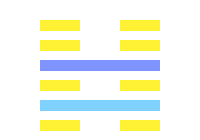
40.1.3.4.5.6 (40 > 9) - THE KIEH HEXAGRAM.
- 1. The first line, divided, shows that its subject will commit no error.
- 3. The third line, divided, shows a porter with his burden, (yet) riding in a carriage. He will (only) tempt robbers to attack him. However firm and correct he may (try to) be, there will be cause for regret.
- 4. (To the subject of) the fourth line, undivided, (it is said), ‘Remove your toes. Friends will (then) come, between you and whom there will be mutual confidence.’
- 5. The fifth line, divided, shows (its subject), the superior man ( = the ruler), executing his function of removing (whatever is injurious to the idea of the hexagram), in which case there will be good fortune, and confidence in him will be shown even by the small men.
- 6. In the sixth line, divided, we see a feudal prince (with his bow) shooting at a falcon on the top of a high wall, and hitting it. (The effect of his action) will be in every way advantageous.
40.1.3.4.5.6 (40 > 9) - Just saying no
One can contradict others without having to demonstrate.
Bing DeepL Google Yandex40.1.3.4.5.6 (40 > 9) - Just saying no
One can contradict others without having to demonstrate.
Bing DeepL Google Yandex40.1.3.4.5.6 (40 > 9) - Kieh, la libération
Kieh : 1. Délivrer, faire échapper, échapper au danger ; 2. Disperser ; 3. Ouvrir, séparer, s’ouvrir. Se dit du mouvement de la germination. 4. Résoudre une difficulté, une complication.
-
1. Délivrer quelqu’un est chose excellente.
Quand le fort et le faible s’entendent selon la justice, il n’y a pas de faute à craindre. -
3. Si un porteur se met dans un char et qu’il survienne des voleurs, il sera attaqué et échappera difficilement ; s’il abandonne sa charge, il pourra se sauver.
Pour un porteur, aller en char est honteux ; c’est attirer sur soi les voleurs.
Il n’appartient pas à des gens du commun d’aller en char . -
4. Échappez d’abord et après cela les amis viendront témoigner leur fidélité (sinon ils vous abandonnent).
Note. Le mot qui signifie ordinairement gros orteil est expliqué par les commentateurs comme ayant ici le sens de tchū, commencement, d’abord - 5. C’est au sage d’écarter (les maux) et de résoudre (les difficultés) ; s’il y réussit, il gagnera la confiance du vulgaire.
- 6. Si le prince est assez habile pour atteindre d’une flèche un faucon posé sur le haut d’un mur élevé, il aura le succès et saura disperser les rebelles.
40.1.3.4.5.6 (40 > 9) - Se contenter de dire non
On peut contredire les autres sans avoir à faire de démonstration.
Bing DeepL Google Yandex40.1.3.4.5.6 (40 > 9) - Módosítás
- 1. Fel akarja szabadítani magát, ez egy jó döntés.
- 3. Ha valaki elhanyagolja, másoknak adja.
- 4. Ajtók fognak megnyílni ha valaki felhagy a felesleges kényelemkereséssel.
- 5. Csak egy alkalmas személy tudja megmutatni a megoldást.
- 6. Miután felkészül, meg tudja oldani a problémákat időben.
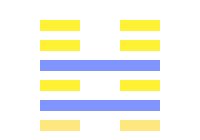
40.2.3.4.5.6 (40 > 53) - THE KIEH HEXAGRAM.
- 2. The second line, undivided, shows its subject catch, in hunting, three foxes, and obtain the yellow ( = golden) arrows. With firm correctness there will be good fortune.
- 3. The third line, divided, shows a porter with his burden, (yet) riding in a carriage. He will (only) tempt robbers to attack him. However firm and correct he may (try to) be, there will be cause for regret.
- 4. (To the subject of) the fourth line, undivided, (it is said), ‘Remove your toes. Friends will (then) come, between you and whom there will be mutual confidence.’
- 5. The fifth line, divided, shows (its subject), the superior man ( = the ruler), executing his function of removing (whatever is injurious to the idea of the hexagram), in which case there will be good fortune, and confidence in him will be shown even by the small men.
- 6. In the sixth line, divided, we see a feudal prince (with his bow) shooting at a falcon on the top of a high wall, and hitting it. (The effect of his action) will be in every way advantageous.
40.2.3.4.5.6 (40 > 53) - Being convinced of one's success
One should necessarily be selected since one has met all the criteria and the others have not been as skilled.
Bing DeepL Google Yandex40.2.3.4.5.6 (40 > 53) - Being convinced of one's success
One should necessarily be selected since one has met all the criteria and the others have not been as skilled.
Bing DeepL Google Yandex40.2.3.4.5.6 (40 > 53) - Kieh, la libération
Kieh : 1. Délivrer, faire échapper, échapper au danger ; 2. Disperser ; 3. Ouvrir, séparer, s’ouvrir. Se dit du mouvement de la germination. 4. Résoudre une difficulté, une complication.
- 2. Délivrer est aussi heureux que, pour le chasseur, prendre trois renards et obtenir le prix, la flèche d’or. — Celui qui résout une difficulté, fait sortir d’une position difficile, est comme le chasseur qui prend trois renards et obtient la flèche d’or.
-
3. Si un porteur se met dans un char et qu’il survienne des voleurs, il sera attaqué et échappera difficilement ; s’il abandonne sa charge, il pourra se sauver.
Pour un porteur, aller en char est honteux ; c’est attirer sur soi les voleurs.
Il n’appartient pas à des gens du commun d’aller en char . -
4. Échappez d’abord et après cela les amis viendront témoigner leur fidélité (sinon ils vous abandonnent).
Note. Le mot qui signifie ordinairement gros orteil est expliqué par les commentateurs comme ayant ici le sens de tchū, commencement, d’abord - 5. C’est au sage d’écarter (les maux) et de résoudre (les difficultés) ; s’il y réussit, il gagnera la confiance du vulgaire.
- 6. Si le prince est assez habile pour atteindre d’une flèche un faucon posé sur le haut d’un mur élevé, il aura le succès et saura disperser les rebelles.
40.2.3.4.5.6 (40 > 53) - Être convaincu de sa réussite
On devrait forcément être retenu puisqu'on a satisfait tous les critères et que les autres n'ont pas été aussi habiles.
Bing DeepL Google Yandex40.2.3.4.5.6 (40 > 53) - Módosítás
- 2. Megkérik hogy válaszokat keressen mielőtt túl késő.
- 3. Ha valaki elhanyagolja, másoknak adja.
- 4. Ajtók fognak megnyílni ha valaki felhagy a felesleges kényelemkereséssel.
- 5. Csak egy alkalmas személy tudja megmutatni a megoldást.
- 6. Miután felkészül, meg tudja oldani a problémákat időben.
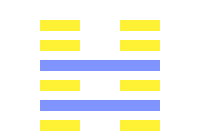
40.1.2.3.4.5.6 (40 > 37) - THE KIEH HEXAGRAM.
- 1. The first line, divided, shows that its subject will commit no error.
- 2. The second line, undivided, shows its subject catch, in hunting, three foxes, and obtain the yellow ( = golden) arrows. With firm correctness there will be good fortune.
- 3. The third line, divided, shows a porter with his burden, (yet) riding in a carriage. He will (only) tempt robbers to attack him. However firm and correct he may (try to) be, there will be cause for regret.
- 4. (To the subject of) the fourth line, undivided, (it is said), ‘Remove your toes. Friends will (then) come, between you and whom there will be mutual confidence.’
- 5. The fifth line, divided, shows (its subject), the superior man ( = the ruler), executing his function of removing (whatever is injurious to the idea of the hexagram), in which case there will be good fortune, and confidence in him will be shown even by the small men.
- 6. In the sixth line, divided, we see a feudal prince (with his bow) shooting at a falcon on the top of a high wall, and hitting it. (The effect of his action) will be in every way advantageous.
40.1.2.3.4.5.6 (40 > 37) - Requesting a transfer
One brings up ancient prayers from the past.
Bing DeepL Google Yandex40.1.2.3.4.5.6 (40 > 37) - Requesting a transfer
One brings up ancient prayers from the past.
Bing DeepL Google Yandex40.1.2.3.4.5.6 (40 > 37) - Kieh, la libération
Kieh : 1. Délivrer, faire échapper, échapper au danger ; 2. Disperser ; 3. Ouvrir, séparer, s’ouvrir. Se dit du mouvement de la germination. 4. Résoudre une difficulté, une complication.
-
1. Délivrer quelqu’un est chose excellente.
Quand le fort et le faible s’entendent selon la justice, il n’y a pas de faute à craindre. - 2. Délivrer est aussi heureux que, pour le chasseur, prendre trois renards et obtenir le prix, la flèche d’or. — Celui qui résout une difficulté, fait sortir d’une position difficile, est comme le chasseur qui prend trois renards et obtient la flèche d’or.
-
3. Si un porteur se met dans un char et qu’il survienne des voleurs, il sera attaqué et échappera difficilement ; s’il abandonne sa charge, il pourra se sauver.
Pour un porteur, aller en char est honteux ; c’est attirer sur soi les voleurs.
Il n’appartient pas à des gens du commun d’aller en char . -
4. Échappez d’abord et après cela les amis viendront témoigner leur fidélité (sinon ils vous abandonnent).
Note. Le mot qui signifie ordinairement gros orteil est expliqué par les commentateurs comme ayant ici le sens de tchū, commencement, d’abord - 5. C’est au sage d’écarter (les maux) et de résoudre (les difficultés) ; s’il y réussit, il gagnera la confiance du vulgaire.
- 6. Si le prince est assez habile pour atteindre d’une flèche un faucon posé sur le haut d’un mur élevé, il aura le succès et saura disperser les rebelles.
40.1.2.3.4.5.6 (40 > 37) - Demander une mutation
On fait ressurgir du passé d'antiques prières.
Bing DeepL Google Yandex40.1.2.3.4.5.6 (40 > 37) - Módosítás
- 1. Fel akarja szabadítani magát, ez egy jó döntés.
- 2. Megkérik hogy válaszokat keressen mielőtt túl késő.
- 3. Ha valaki elhanyagolja, másoknak adja.
- 4. Ajtók fognak megnyílni ha valaki felhagy a felesleges kényelemkereséssel.
- 5. Csak egy alkalmas személy tudja megmutatni a megoldást.
- 6. Miután felkészül, meg tudja oldani a problémákat időben.

